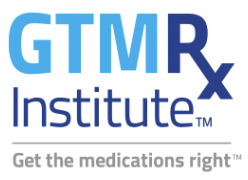
It’s really about thinking about More than the Pill – we need to ensure the right questions are being asked and the right process of care is in place to manage medications the right way
TYSONS CORNER, Va. (PRWEB)
May 18, 2022
According to a recent GTMRx study of more than two-hundred health care leaders, half said they believe a lack of communication between prescribers (i.e. physicians, specialists, other prescribers) and pharmacists will continue to be the biggest issue in managing medications in the year ahead. As a result, today, The Get the Medications Right™ (GTMRx) Institute, a coalition of over 1600 members calling for medication management reform brings together critical stakeholders across health care, is sharing tips to make it easier for patients and caregivers to understand how to address and assess the management of their medications and how it relates to their health.
“GTMRx advocates for the broad adoption and payment for comprehensive medication management (CMM), a more rational process of care in which physicians and clinical pharmacists work together to ensure that each medication is appropriate, safe and effective for the patient,” said Katherine H. Capps, co-founder and executive director. “We believe strongly that patients and caregivers should be better advocates for their own care as well as for the care of their loved ones. It’s really about thinking about More than the Pill – we need to ensure the right questions are being asked and the right process of care is in place to manage medications the right way.”
Here are five questions consumers and their caregivers can and should ask their physicians and their pharmacists to be better informed and more engaged in the medication therapies that affect their health and lives. These questions can help both caregivers and patients ensure they are asking the right questions to providers,to receive the necessary intel to get the medications right.
-
1. Is this the right medication? This is the first and most important question a patient or caregiver can ask. For many patients, the answer is yes, but it is still the starting point of a new conversation with your primary care physician. Tell your doctor that you (or your designated caregiver) want to be an active participant in your health care strategy—that you have questions and you are willing to invest the time to learn the answers. - 2. Is there someone on the team I can talk to if I have questions about these medications? The more doctors we see and the more medications we take, the more complicated it becomes to coordinate care. When a dose is too high or low or a new medication conflicts with the current regime, it can make a person sicker, not better. A regular cadence of consistent expert review can head off disaster.
- 3. What is the right dosing for the medication? Spoons belong in the kitchen drawer instead of the medicine cabinet. Learn to properly use the dosing device that comes with the medication; Milliliters matter. Call the American Association of Poison Control Centers at 1-800-222-1222 for advice and help — and immediately in case of an accidental overdose.
- 4. When is the right time to change and discontinue medications? There are medications that some people require indefinitely for chronic disease — but that is not the intention for every therapy. Health conditions change. New therapies reach the market, so it is critical to understand if the prescription still meets the doctor’s goals. Is a medication causing nausea, headaches or changes in appetite? Has your insurers’ formulary changed? Are there alternatives?
-
5. How do I know if the medication is working? An effective assessment process is reiterative and ongoing. Goals are personalized and understood by the patient, caregiver and all members of the care team, so it is imperative that a patient’s health care team conduct ongoing evaluating and assessing of medication outcomes. Caregivers and patients can step in to make sure it happens.
For more insights into what consumers should know, visit https://gtmr.org/consumer-education-tools/.
About the Get the Medications Right™ Institute
The GTMRx Institute is a catalyst for change that brings critical stakeholders together, bound by the urgent need to get the medications right. We are physicians, pharmacists, nurses, patients, health IT innovators, drug and diagnostics companies, consumer groups, employers, payers — aligned to save lives and save money through comprehensive medication management. By showcasing evidence and innovation, we motivate practice transformation and push payment and policy reform. Together, we ACT to champion appropriate, effective, safe and precise use of medication and gene therapies. Learn more at gtmr.org.
Share article on social media or email:

